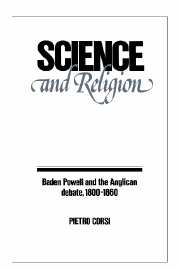Baden Powell and the Noetic school
Published online by Cambridge University Press: 15 December 2009
Summary
Before discussing the relevance of the late Noetic school to Baden Powell's intellectual development, it is necessary to consider whether it is legitimate to refer to a ‘late Noetic school’ at all. A corollary to this is the question of Whately's leadership. It could indeed be argued that Whately‘s essays, notwithstanding their author's claim that he was approaching his subjects systematically, were in fact occasioned by contemporary and often ephemeral debates. It could also reveal at tbime essaid that the works by members of the group significant differences of emphasis and of approach.
As far as the first point is concerned, it has already been made clear that Whately's approach to themes on which he touched evolved out of a sophisticated and coherent theological and philosophical culture. His contributions to a variety of topics have a common denominator in an intellectual programme that has been ignored by past and present historians. As far as the second point is concerned, it is undoubtedly true that there were differences within the Noetic group. Nevertheless, theologians, historians, and naturalists linked with Whately and his friends at Oriel were described by contemporaries as members of a well-defined political and cultural circle. Furthermore, historians have often overlooked the fact that the Noetics made a serious and determined effort to extend their influence on both academic and public opinion. In this context the publication of the London Review in the summer of 1828 should be mentioned. This editorial venture was designed to provide the late Noetics with a means of promoting their social, philosophical and theological programme.
- Type
- Chapter
- Information
- Science and ReligionBaden Powell and the Anglican Debate, 1800–1860, pp. 83 - 84Publisher: Cambridge University PressPrint publication year: 1988

